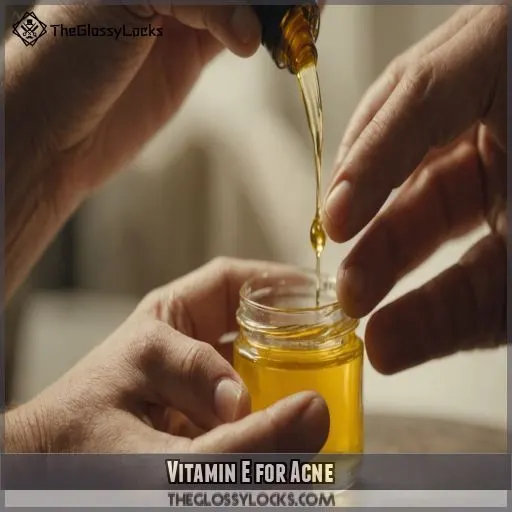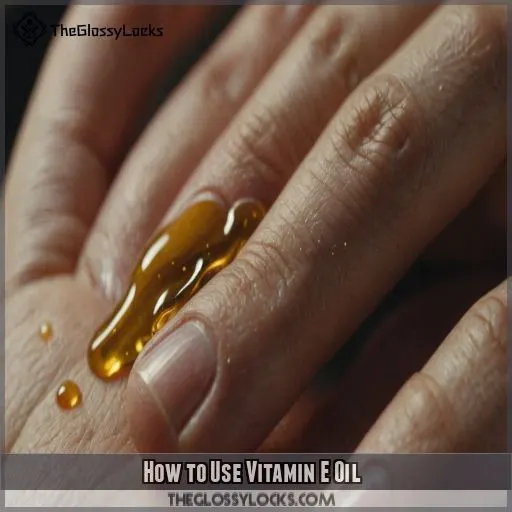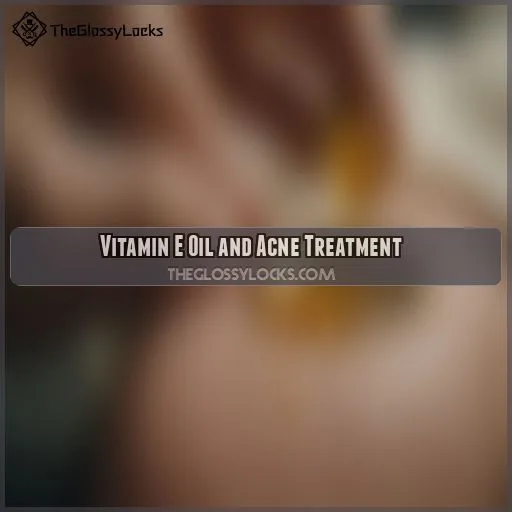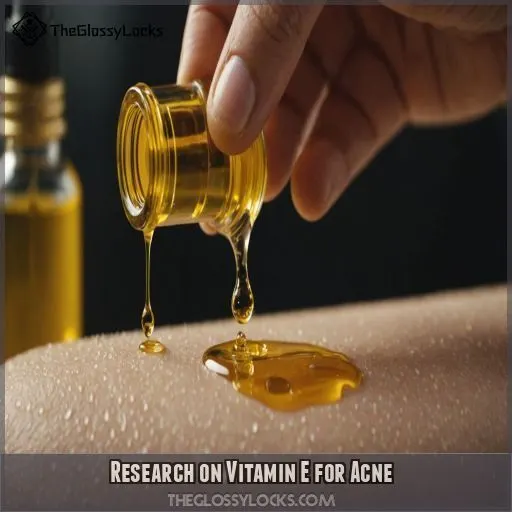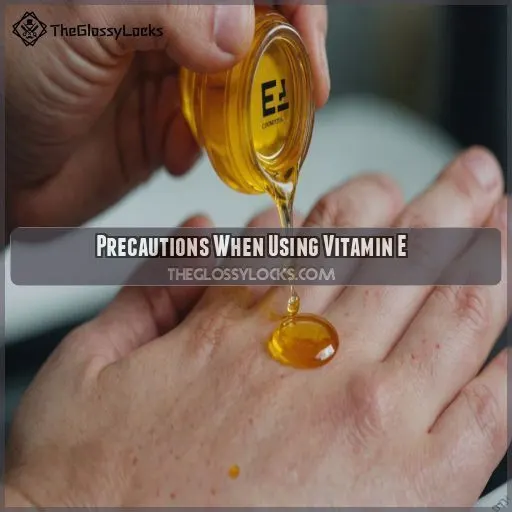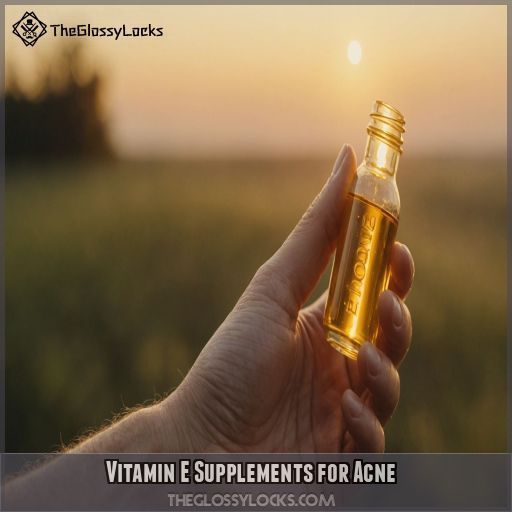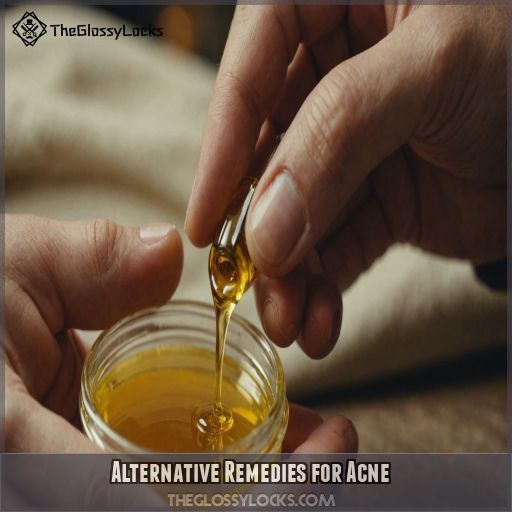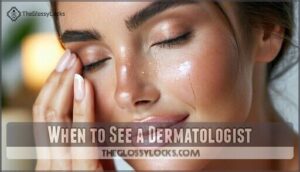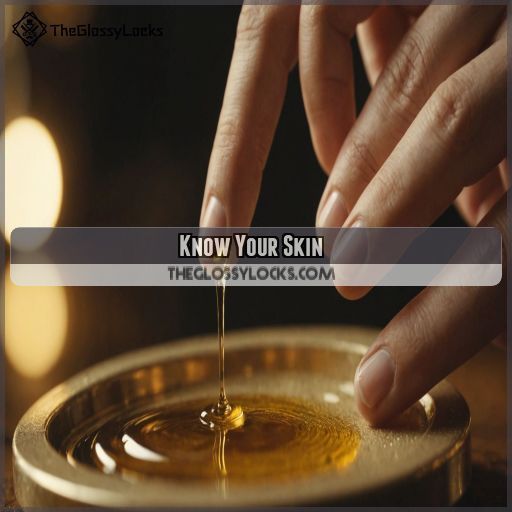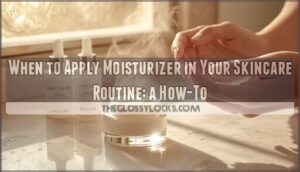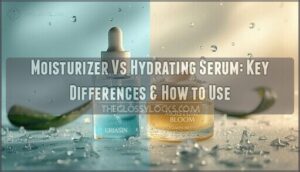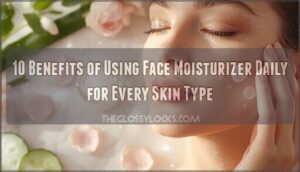This site is supported by our readers. We may earn a commission, at no cost to you, if you purchase through links.
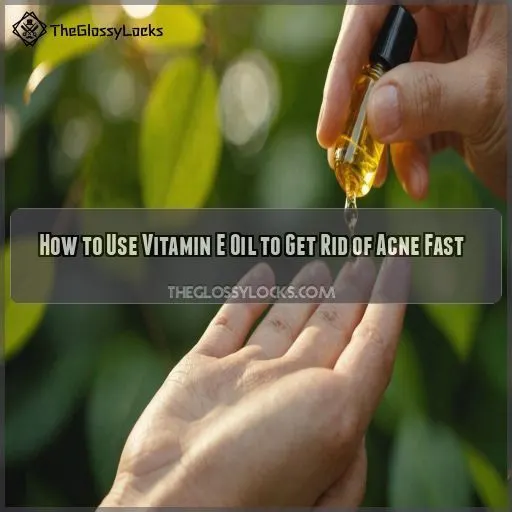
To get rid of acne with vitamin E oil, start by mixing a few drops with a lightweight carrier oil like jojoba. Apply this concoction directly to your blemishes** before bed – think of it as tucking your skin in for the night.
For oily skin, opt for a vitamin E-infused serum or toner. If you’re more on the dry side, blend it with your favorite moisturizer.
Ready to learn more about vitamin E and acne-fighting?
Table Of Contents
- Key Takeaways
- Vitamin E for Acne
- How to Use Vitamin E Oil
- Vitamin E Oil and Acne Treatment
- Research on Vitamin E for Acne
- Precautions When Using Vitamin E
- Vitamin E Supplements for Acne
- Alternative Remedies for Acne
- When to See a Dermatologist
- Know Your Skin
- Frequently Asked Questions (FAQs)
- Does vitamin E oil help with acne?
- Is it OK to put vitamin E oil on your face?
- How much vitamin E to take for acne?
- How do you use vitamin E oil without clogging your pores?
- Can vitamin E oil be used on all skin types?
- How long does it take to see results?
- Is vitamin E oil safe during pregnancy?
- Can vitamin E oil be combined with other acne treatments?
- Does vitamin E oil expire or lose effectiveness?
- Conclusion
Key Takeaways
- Vitamin E oil is like a superhero sidekick for your skin, fighting off those pesky free radicals and calming inflammation. Just remember, a little goes a long way – you don’t want to drown your pores!
- Mix and match for maximum impact! Blend vitamin E with jojoba oil for a nighttime treat, or add it to your favorite moisturizer if you’re battling dry skin. For the oily-skinned crowd, a vitamin E serum might be your new BFF.
- Patience is a virtue, especially when it comes to clear skin. Give vitamin E oil about 4-8 weeks to work its magic. Rome wasn’t built in a day, and neither is flawless skin!
- When in doubt, call in the pros. If your acne is throwing a stubborn tantrum or leaving scars, it might be time to chat with a dermatologist. They’ve got a whole toolbox of tricks up their sleeves!
Vitamin E for Acne
You’ve probably heard that Vitamin E is a skincare superhero, but how does it measure up against acne? Well, this powerful antioxidant can protect your skin from free radicals and environmental stress, which are major factors in acne breakouts.
Let’s take a closer look and explore how Vitamin E oil can become your secret weapon in the battle against acne.
Benefits for Acne-Prone Skin
Vitamin E oil is a powerful tool for battling acne. It’s an antioxidant that protects your skin from free radicals and environmental stress. This oil also has anti-inflammatory properties, helping to soothe and calm irritated skin.
Vitamin E oil can reduce acne nodules, cysts, papules, pustules, and scars. It’s a versatile ingredient that can be applied topically or taken orally as a supplement.
Let’s take a closer look at how this superhero ingredient can help you achieve clearer skin.
How It Helps With Acne
Vitamin E oil can be a powerful tool in your acne-fighting arsenal.
It’s an antioxidant powerhouse, shielding your skin from free radicals and environmental stress.
That’s a fancy way of saying it helps protect your skin from things like pollution and sun damage, which can make acne worse.
Vitamin E oil also moisturizes and soothes your skin, keeping it calm and happy.
Anti-Inflammatory Properties
Vitamin E oil is a powerful ally in your skincare arsenal, especially when it comes to tackling acne. Its anti-inflammatory properties are a key weapon in your battle against breakouts. Here’s how it works:
- Fights inflammation: Vitamin E’s anti-inflammatory properties help calm angry, inflamed skin. It’s like sending in a peacekeeper to negotiate a truce between your skin and those pesky pimples.
- Neutralizes free radicals: These antioxidants swoop in to neutralize free radicals, those pesky molecules that can cause skin damage and inflammation. Think of them as your skin’s personal bodyguards, protecting it from environmental stressors.
- Supports skin health: Vitamin E also plays nicely with other nutrients like omega-3 and omega-6 fatty acids, which are essential for maintaining healthy skin. Together, they form a dream team to keep your skin happy and glowing.
How to Use Vitamin E Oil
So, you’re thinking of adding vitamin E oil to your skincare routine to tackle acne. Great idea! Let’s get into the specifics of how to use this powerhouse ingredient for maximum results.
I know how frustrating acne can be, and you’re probably ready to get started, so let’s not waste any time.
Applying Vitamin E Oil for Acne
To harness the benefits of vitamin E oil for acne-prone skin, here’s how to incorporate it into your skincare routine:
| Type of Skin | Recommended Application of Vitamin E Oil |
|---|---|
| Oily Skin | Use a serum or toner formulated with vitamin E oil to avoid clogging pores. |
| Dry Skin | N/A |
| Sensitive Skin | N/A |
| Combination Skin | N/A |
Before bedtime, apply a thin layer of vitamin E oil or a product containing it to your face. This will give your skin a boost of antioxidants and help calm any inflammation.
Mixing With Moisturizer for Dry Skin
If you have dry skin, you can mix vitamin E oil with your moisturizer to help combat acne.
This two-in-one approach lets you tackle acne while keeping your skin hydrated.
Just remember, a little vitamin E oil goes a long way.
You don’t want to overload your skin, especially if you’re prone to acne.
Using Serum or Toner for Oily Skin
If you’ve got oily skin, vitamin E serum is your bestie. It’s lightweight and absorbs quickly, giving your skin a drink without the greasy feel.
Go for a serum with vitamin E and other acne-fighting ingredients like selenium, probiotics, magnesium, or green tea extract. These ingredients work together to calm angry skin and keep breakouts at bay.
Toner-wise, look for alcohol-free formulas with hydrating ingredients. Toners help balance your skin’s pH, and when paired with vitamin E, they create a dream team that keeps oil in check.
Vitamin E Oil and Acne Treatment
We all know acne’s a pain, but could vitamin E oil be the answer to clearer skin? Let’s take a closer look at the research and find out how this powerful antioxidant can help fight those pesky pimples.
Topical Application for Acne
If you’re thinking about using vitamin E oil for acne, a little goes a long way.
Apply a thin layer to your face before bed.
If you have oily skin, opt for a serum or toner.
If dryness is your issue, mix it with your favorite moisturizer.
Dietary Considerations for Acne
Clearing up acne isn’t just about what you put on your skin, it’s also about what you eat. Here are some food things to keep in mind:
- Food sensitivities and acne diet plans: Figure out any food triggers through an elimination diet or sensitivity test.
- Sugar impact: Limit sugar and refined carbs to reduce inflammation and breakouts.
- Probiotics: Support skin health from within with probiotics for a healthy gut and reduced acne-causing bacteria.
- Hydration and vitamin D: Stay hydrated and make sure you get enough vitamin D for overall skin health.
Drawbacks of Using Vitamin E Oil
While vitamin E oil can be a powerful tool in the fight against acne, it’s not without its potential pitfalls. Here’s what you need to watch out for:
- Clogged Pores: If you’ve got oily skin, be cautious as vitamin E oil may clog your pores, leading to more breakouts.
- Allergic Reactions: Always do a patch test before applying vitamin E oil to your face. While rare, some people may experience an allergic reaction.
- Overuse: Don’t go overboard with vitamin E oil. Too much of a good thing can lead to side effects like an upset stomach or even an increased risk of bleeding.
- Dilution: Pure vitamin E oil is potent stuff. Remember to dilute it with a carrier oil before applying directly to your skin.
Research on Vitamin E for Acne
While vitamin E oil is a popular choice for skincare, you might wonder if it’s more than just hype. Let’s take a closer look at the research to uncover the facts about using vitamin E oil to tackle acne.
Effectiveness of Topical Vitamin E
Topical vitamin E is a popular choice for acne treatment, but does it actually work?
It seems to be effective for some people.
One study found that topical vitamin E, combined with zinc and lactoferrin, successfully treated severe acne in adults within three months.
However, vitamin E alone isn’t a miracle cure for acne or acne scars.
While it can moisturize dry skin and soothe irritation, it doesn’t seem to speed up healing, so it might not be as helpful for acne scarring as some believe.
Combination With Other Ingredients
Vitamin E is a team player and works well with others.
When combined with zinc and lactoferrin, it’s a powerful trio that delivers a one-two punch to acne.
Vitamins A and E are like a dynamic duo, tackling acne together.
And don’t forget retinol, green tea, and niacinamide—they’re like the Avengers of skincare, each with their unique superpowers to battle breakouts.
Dietary Deficiencies and Acne
Vitamin E and zinc deficiencies have been linked to acne. Eating a well-rounded diet rich in vitamin E and other nutrients is key to maintaining clear skin.
Here are some foods that are naturally high in vitamin E:
- Safflower oil
- Sunflower oil
- Corn oil
- Soybean oil
- Almonds
- Sunflower seeds
- Hazelnuts
- Fortified cereals
If you’re not getting enough vitamin E from your diet, supplements can help. They can be especially beneficial for treating acne from the inside out. Just be sure to consult a doctor first, as too much vitamin E can have risks.
Precautions When Using Vitamin E
While vitamin E oil can be a powerful tool in your acne-fighting arsenal, it’s important to tread carefully. There are a few potential pitfalls to watch out for.
Let’s take a closer look at the precautions you should take when using vitamin E to make sure you’re getting the benefits without any nasty surprises.
Risk of Overdose and Bleeding
Vitamin E is generally safe.
It’s possible to have too much of a good thing.
While it’s rare, taking high doses of vitamin E supplements can lead to an overdose.
This may increase your risk of bleeding, especially if you’re also taking blood thinners.
Always chat with your doctor before taking supplements, especially if you’re on medication.
They’ll help you find the right vitamin E dosage to keep you safe and healthy.
Clogged Pores in Oily Skin
If you have oily skin, be cautious when using vitamin E oil as it can clog your pores.
This is especially true if you’re prone to blackheads and enlarged pores.
To avoid this, opt for a lightweight vitamin E serum or toner instead of a heavy oil.
Exfoliating regularly can also help keep your pores clear and your skin looking fresh.
Consulting a Doctor Before Supplements
While vitamin E can be a beneficial supplement, it’s important to consult a doctor before adding it to your routine, especially if you’re considering oral supplements. Here’s why:
- Acne Severity: Depending on the severity of your acne, a dermatologist may recommend a personalized treatment plan that includes specific medications or procedures. They can advise on whether vitamin E supplements are suitable for your specific case.
- Supplement Interactions: If you’re already taking other supplements or medications, a doctor can assess potential interactions with vitamin E. This is key to avoid any negative effects or interference with your current treatments.
- Personalized Treatment: A dermatologist can tailor a treatment plan to your skin’s unique needs. They may recommend specific formulations or dosages of vitamin E that are most suitable for your skin type and acne severity.
- Supplement Risks: Taking high doses of vitamin E supplements without medical supervision can lead to an increased risk of bleeding. A doctor can guide you on safe dosages and monitor your progress to make sure the supplements are benefiting your skin without causing harm.
Vitamin E Supplements for Acne
While the benefits of Topical vitamin E for acne are well-known, oral vitamin E supplements are another option to explore. They work from the inside out, reducing inflammation, promoting clear skin, and even fading acne scars.
Benefits of Oral Supplements
Oral vitamin E supplements can be a powerful way to boost your body’s defense against acne.
They work from the inside out, reducing inflammation, promoting clear skin, and fading acne scars.
Vitamin E’s antioxidant properties protect your skin from free radical damage, while its anti-inflammatory nature soothes irritated skin.
When paired with other vitamins and minerals, it can create a synergistic effect, enhancing its acne-fighting abilities.
Effective Supplements for Acne
You’re looking for ways to fight acne, right? There are tons of supplements out there that can help. Zinc, omega-3 fatty acids, and green tea extract are all known to be effective. Omega-3s, for example, calm down inflammation and shrink those pesky acne bumps.
Maca root is another supplement that can help. It keeps your hormones in balance and tells cortisol, your stress hormone, to take a chill pill.
And don’t forget probiotics! These good bacteria help with digestion, boost your immune system, and tell those acne-causing bacteria to scram.
Avoiding Certain Supplements
While supplements can be helpful, some might worsen your acne. Here’s a quick rundown of what to watch out for:
- Vitamin B12: Too much can trigger breakouts faster than you can say "pimple."
- Iodine: It’s like a magnet for inflammatory pustules.
- Timing matters: Taking certain supplements at night might disrupt your sleep.
- Doctor’s orders: Always chat with a pro before starting any new supplement regimen.
Alternative Remedies for Acne
While vitamin E oil can be effective for acne, there are other natural remedies worth exploring. Let’s take a look at some alternative options that might help you say goodbye to those pesky breakouts.
Natural Remedies for Acne
Looking for natural ways to tackle acne? You’re in luck! Mother Nature’s got some tricks up her sleeve.
Tea tree oil, apple cider vinegar, and aloe vera are like superhero sidekicks for your skin.
Want to pamper yourself? Try a honey mask or clay mask – they’re like spa treatments in your own bathroom!
These remedies can be gentle yet effective, giving those pesky pimples a run for their money.
Milk Thistle and Evening Primrose Oil
Beyond vitamin E, you’ve got more natural options up your sleeve. Let’s talk about milk thistle and evening primrose oil – they’re like nature’s dynamic duo for acne-prone skin. Here’s what you need to know:
- Milk thistle’s antioxidant properties fight inflammation
- Evening primrose oil contains gamma-linoleic acid, a skin-soothing superstar
- Blend these oils for a powerful acne-fighting concoction
- They work great as spot treatments or in your daily moisturizer
- Results vary, so give it time and listen to your skin
Probiotics and Selenium for Acne
Looking for natural acne fighters? Probiotics and selenium might be your new best friends. These powerhouses can help balance your skin’s microbiome and fight those pesky pimples. Check out this quick guide to see how they stack up:
| Supplement | Benefits | Recommended Dosage |
|---|---|---|
| Probiotics | Gut health boost | 1-10 billion CFU daily |
| Acne-fighting bacteria | ||
| Selenium | Antioxidant properties | 55-400 mcg daily |
| Supports skin health | ||
| May reduce inflammation |
When to See a Dermatologist
While vitamin E oil can be helpful for acne, sometimes you need a professional’s touch. If your acne persists or worsens despite at-home treatments, it’s time to consult a dermatologist who can provide personalized care and advanced treatment options.
Seeking Professional Help for Acne
While natural remedies can help, sometimes you need a pro. If your acne’s stubborn or severe, it’s time to see a dermatologist. They’ll assess your skin and recommend treatments that are just right for you. Here’s when to book that appointment:
- Your acne’s leaving scars
- Over-the-counter products aren’t cutting it
- You’re feeling down about your skin
- Acne’s affecting your daily life
Don’t worry about costs; many insurance plans cover acne treatments. Remember, clear skin is worth the investment!
Board-Certified Dermatologists
While vitamin E can be helpful, sometimes you need a pro in your corner.
Enter board-certified dermatologists – the superheroes of skin care.
These experts have the lowdown on all things acne, from pesky pimples to stubborn scars.
They’ve got a toolbox full of treatment options that go beyond over-the-counter remedies.
Scheduling a Consultation
After finding a board-certified dermatologist, it’s time to schedule your consultation. Don’t let nerves hold you back – this is your chance to get expert advice that’s perfect for your skin. Here’s what you need to know:
- Prepare a list of questions about vitamin E and acne treatments
- Bring your current skincare products for review
- Be ready to discuss your medical history and lifestyle factors
Know Your Skin
Knowing your skin type and what it needs is really important when using vitamin E oil for acne. Once you understand your skin’s quirks and how it reacts to different things, you’ll be better at making a skincare routine that works for you and gets the most out of vitamin E.
Vitamin E and Skin Health
Now that you know when to see a dermatologist, let’s talk about vitamin E and your skin’s health. Knowing your skin is like having a superpower in your skincare routine. Vitamin E isn’t just a one-trick pony; it’s got a whole bag of tricks up its sleeve. Check out this handy table to see how vitamin E can be your skin’s new best friend:
| Benefit | How It Helps |
|---|---|
| Moisturizing | Keeps skin hydrated |
| Antioxidant | Fights free radicals |
| Anti-aging | Reduces fine lines |
| Healing | Supports cell regeneration |
Understanding Acne and Vitamin E
Now that you’re armed with vitamin E knowledge, let’s tackle acne head-on. Understanding your skin and how it reacts to this powerhouse nutrient is key. Here’s a quick rundown of what you need to know:
- Acne types: From pesky blackheads to angry cysts
- Skin types: Oily, dry, or combination – each needs different care
- Vitamin E oil: Not a one-size-fits-all solution
- Research: Promising results, but more studies needed
Frequently Asked Questions (FAQs)
Does vitamin E oil help with acne?
Vitamin E’s vivid virtues can combat acne! You’ll find it’s a potent protector, shielding your skin from free radicals and soothing inflammation. It’s not a miracle cure, but it’ll boost your battle against blemishes when used wisely.
Is it OK to put vitamin E oil on your face?
You can apply vitamin E oil to your face, but be cautious. It’s best to dilute it with a carrier oil first. If you’ve got oily skin, it might clog your pores, so start with a patch test.
How much vitamin E to take for acne?
You’ll want to aim for 15 mg of vitamin E daily for acne. But don’t go overboard – too much can be risky. Chat with your doc before popping supplements, and consider topical options for targeted treatment.
How do you use vitamin E oil without clogging your pores?
Like a gentle caress, you’ll want to tread lightly with vitamin E oil. Dilute it with a carrier oil, apply sparingly at night, and opt for non-comedogenic formulations. You’re in control – start small and listen to your skin’s response.
Can vitamin E oil be used on all skin types?
You can use vitamin E oil on most skin types, but be cautious if you’re acne-prone. It’s like a Swiss Army knife for skin – versatile, but not one-size-fits-all. Start with a patch test to avoid surprises!
How long does it take to see results?
Imagine Sarah’s frustration fading after a month of consistent use. You’ll typically see results within 4-8 weeks. Be patient and stick to your routine. Remember, everyone’s skin is unique, so your timeline might vary slightly.
Is vitamin E oil safe during pregnancy?
While vitamin E oil’s generally safe during pregnancy, you’ll want to chat with your doc first. They’ll guide you on proper use and dosage. Remember, a little goes a long way – don’t overdo it, mama-to-be!
Can vitamin E oil be combined with other acne treatments?
You can combine vitamin E oil with other acne treatments, but be cautious. It’s like mixing cocktails – some combos work wonders, others might leave you with a nasty hangover. Always patch test and consult a dermatologist first.
Does vitamin E oil expire or lose effectiveness?
You’re right to wonder about expiration! Vitamin E oil can lose potency over time, typically within 1-2 years. To keep it fresh, store it in a cool, dark place and check for changes in color or smell.
Conclusion
Your skin might be craving some vitamin E love right now!
You now know how to use vitamin E oil to get rid of acne. It’s time to give it a try.
Whether you’re mixing it with a carrier oil, blending it into your moisturizer, or opting for a serum, stick with it.
But don’t forget, everyone’s skin is unique.
If you’re not seeing results or experiencing irritation, it’s time to consult a dermatologist.
Your clear skin journey awaits!

